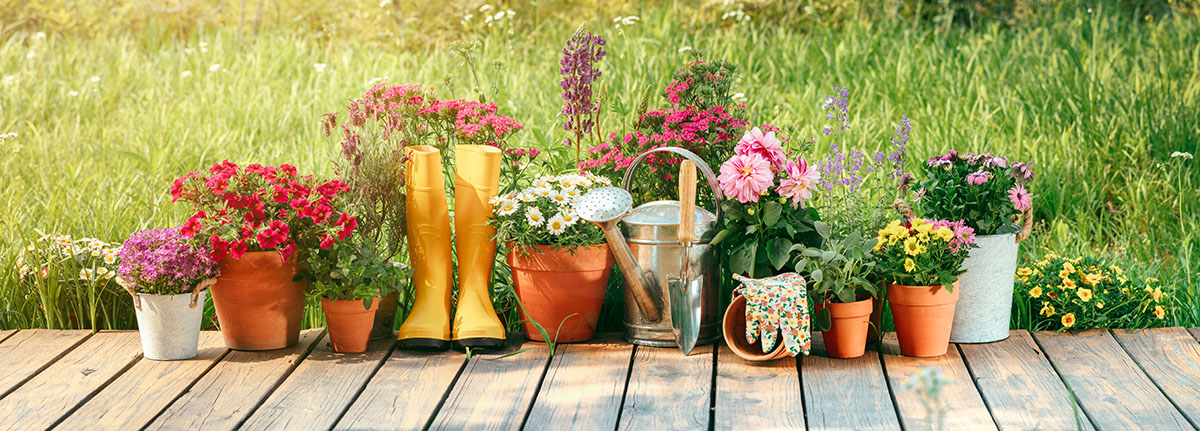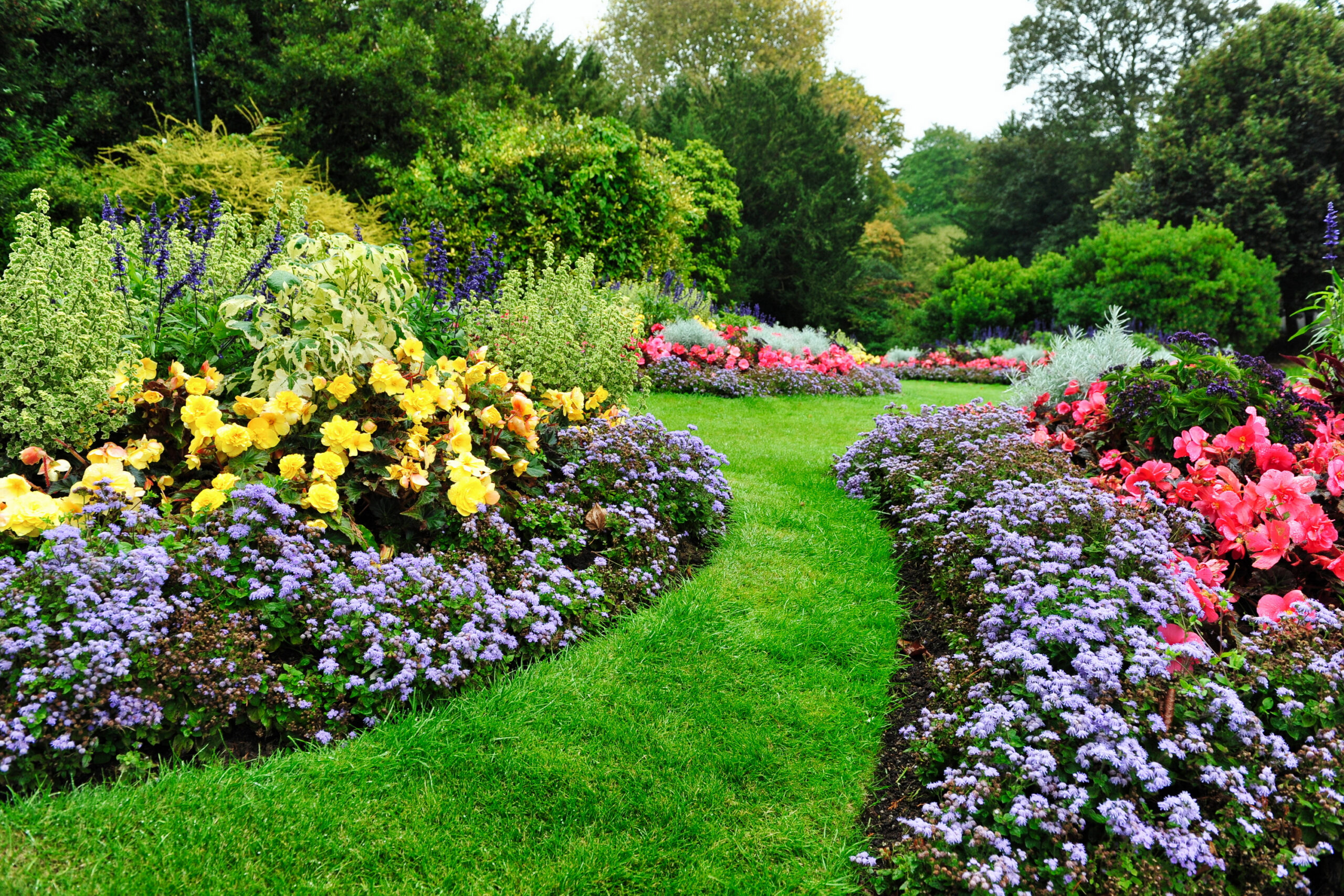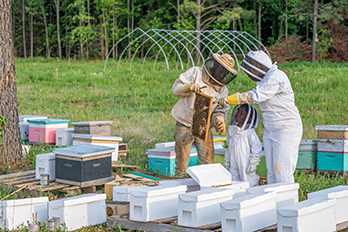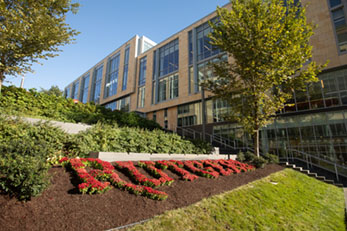Main Content
Rutgers Home Gardeners School provides expert instruction in a variety of classic and innovative gardening and landscaping subjects for beginner and advanced gardeners!

Jump to: Register | Course Details | Overview | Instructor | Reviews | CE Credits | Policies | Contact Us | Related Courses | Join Email List
Register Now
Pay with Credit Card:
Pay with Check or Money Order:
Course Details
Course Name: Home Gardeners School
Course Code: AH0201HA26
Date: March 14, 2026
Time: 9:00 am – 4:00 pm (Check in will begin at 8:00 am in front of Hickman Hall.)
Location: Hickman Hall, 89 George St., New Brunswick, NJ (Directions & Map). Parking is available in the Douglass Parking Deck (Directions & Map). Handicapped parking is available at Hickman Hall.
Format: Live, Instructor-led
Registration Fee: $145 per person
Early Bird Discount Fee: $135 per person (expires February 15, 2026)
Master Gardeners Fee: $125 per person (expires February 15, 2026; must submit MG certificate via email to registration@njaes.rutgers.edu or via mail to Rutgers OCPE – Registration, 102 Ryders Ln, New Brunswick, NJ 08901)
Optional Fees
Boxed Lunch: $18 per person
Hands-on Workshop 1 (Propagation by Seed): $10 per person
Hands-on Workshop 35 (Create a Gourd Planter): $45 per person
Registration Closes: March 10, 2026
Paying with a check, money order, or purchase order?
Payments should be made out to: Rutgers, The State University of New Jersey
Checks and money orders should be mailed to: Office of Continuing Professional Education, Attn: Registration Dept., 102 Ryders Ln, New Brunswick, NJ 08901-8519
Purchase Orders can be mailed to the address above or electronically sent to registration@njaes.rutgers.edu.
About Home Gardeners School (HGS)
Whether you’re just starting out or have years of gardening experience, our programs offer expert instruction in both classic and innovative gardening and landscaping techniques. From hands-on workshops to in-depth presentations, you’ll gain practical skills, new ideas, and inspiration to create and maintain beautiful, sustainable gardens. Join a community of passionate gardeners and grow your knowledge, creativity, and confidence in every season!
Hands-on Workshops
Get ready to roll up your sleeves! We are offering two hands-on workshops that will provide a practical, interactive experience where you can learn by doing. Both sessions are designed to give you the skills and confidence to apply what you learn immediately in a comfortable, small group setting.
These two workshops require payment of an additional fee to cover materials.
Grow With Us!
Sponsoring Home Gardeners School is a meaningful way to support horticultural education and sustainable gardening in our region. Your partnership helps us offer enriching workshops, expert presentations, and community connections that keep the spirit of gardening thriving.
Agenda
| 8:00 am – 9:00 am | Registration |
| 9:00 am – 10:15 am | Workshop Session 1 |
| 10:30 am – 11:45 am | Workshop Session 2 |
| 12:00 pm – 1:00 pm | Lunch |
| 1:15 pm – 2:30 pm | Workshop Session 3 |
| 2:45 pm – 4:00 pm | Workshop Session 4 |
HGS 2026 Workshop Choices
Click here to download a printable workshop schedule for HGS 2026
Review the workshop descriptions below to identify your top choices for each session. You will make your workshop selections in our online registration portal or when speaking to our registrars.
Session 1: 9:00am – 10:15am
Workshop 1: So Much to Know! Propagation by Seed (Hands-on workshop, additional $10 fee) SOLD OUT!
Angela Monaghan, Master Gardener Program Coordinator, Rutgers Cooperative Extension of Middlesex County (Contact Info)
Learn the why and how of propagating plants from seeds in this hands-on workshop. Participants will plant seeds, explore key growing techniques, and take home two seeded pots—one with basil and one native plant—to continue growing at home. All materials provided.
There is an additional $10 charge to attend this workshop.
12/9/2025 update: this workshop is sold out.
Workshop 2: Seashore Gardening with Year-round Color
Irene Wanat, Associate Professor, Gardening Consultant, Master Gardener (Bio)
Wind, salt spray, and all that sand can make gardening at the seashore very challenging! Learn which plants will not only survive these harsh conditions but will flourish and give you a colorful palette for 12 months of the year.
Workshop 3: Garlic, Onions, and Leeks – Oh My!
Justine Gray, Agriculture & Natural Resources Program Associate I, Rutgers Cooperative Extension of Mercer County (Contact Info | Bio)
Wish you never had to run to the grocery store for that last minute ingredient again? Learn how to grow your own edible bulbs – garlic, onions, leeks, and more, right at home. Whether you’re planting in the ground, using raised beds, or trying container gardening, this workshop will cover everything you need to know. We’ll explore planting tips, how to prevent common pests and diseases, and how to set your garden up for a successful (and flavorful!) harvest.
Workshop 4: Growing a Great Lawn
Jim Murphy, Extension Specialist, Department of Plant Biology (Contact Info | Bio)
Are you green with envy of your neighbor’s lush, green, weedless lawn? This presentation will help you turn your lawn into a source of pride. Learn how to get started and then follow a seasonal plan that will ensure success.
Workshop 5: Backyard Beneficials: Inviting Insects into the Landscape
Steven Rettke, Agriculture & Natural Resources Program Associate I (Contact Info / Bio)
This workshop focuses on designing landscapes that attract and support beneficial insects, including pollinators, predators, and parasitoids. Participants will learn how to select and arrange plants to create habitats that encourage insect diversity and enhance ecological balance.
Workshop 6: A Gardener’s Best Friend: Native Bees
Katie Marra, Rutgers (Bio)
Who are native bees? What do they look like? Why are they important? In this session, we will learn how to identify native bees and how to support them in urban community gardens!
Workshop 7: Creative Ways to Grow in Small Spaces
Belinda Chester, Consumer Horticulture Program Associate II; Rutgers Master Gardener Program Coordinator, Rutgers Cooperative Extension of Atlantic County (Contact Info)
Urban dwellers often believe that they can’t have a thriving garden because their space is limited. Overcome this misconception by learning about the many creative ways to make small gardens successful. Vertical gardens, innovative planters and beds, and smart plant selection are just a few things to learn about in this fun, informative presentation.
Workshop 8: Showstopping Planters
Ruth Carll, Agriculture & Natural Resources County Agent III, Rutgers Cooperative Extension (Contact Info / Bio)
Whether you’re a seasoned gardener or just starting out, this fun informative class will show you how to transform any planter into a showstopper! The ideal planter is vibrant, colorful and easy-care! Learn how to bring color, texture, and life to your patio, balcony, or windowsill—no yard required! You’ll discover container “know-how,” planting best practices and expert tips on soil selection, drainage, and plant combinations that thrive together. Perfect for apartment dwellers, homeowners, and anyone with a sunny spot to fill. Planters are a great way to dip your toes into gardening without a big commitment.
Workshop 9: The Folklore of Trees
Steve Kristoph, Owner (Bio)
Discover the fascinating world of tree folklore! In this workshop, we’ll explore how trees have inspired myths and beliefs for centuries—from connecting the earth to the heavens, to symbolizing the cycles of life and death, and even serving as homes for spirits. Join us to uncover the magic and meaning hidden in the trees around us.
Session 2: 10:30am – 11:45am
Workshop 10: Basic Plant Biology for Gardeners
Raul Cabrera, Extension Specialist (Contact Info & Bio)
Learn some basic principles of plant biology that have a direct practical application to the care, maintenance, and enjoyment of garden and landscape plants and trees.
Workshop 11: Creating Beauty Beneath the Trees
Belinda Chester, Consumer Horticulture Program Associate II; Rutgers Master Gardener Program Coordinator, Rutgers Cooperative Extension of Atlantic County (Contact Info)
Do you have a shady spot in your yard that feels like a challenge? Turn it into a lush, inviting retreat! This welcoming class is perfect for beginners and seasoned gardeners alike, offering inspiration and practical guidance to help you design and grow a thriving shade garden. You’ll learn design principles for creating balanced, layered, and beautiful landscape beds that feel like a natural escape. We will also explore a wide variety of shade-loving plants—from bold foliage to delicate blooms. Learn what thrives in dry shade, moist shade, and everything in between.
Workshop 12: How to Get Started with Beekeeping
Mike Haberland, Assoc. Professor / County Agent II (Contact Info)
Have you ever wanted to know more about honeybees? Have you ever wondered if beekeeping is for you? Would you like to learn about honeybee biology and discover what it takes to become a beekeeper? This program will provide you with an introduction to the unique biology of the honeybee, how they organize their colony, make their honey, and what tools beekeepers use to manage a beehive.
Workshop 13: Against All Odds: How Succulents Defy Nature and How You Can Grow Them
Ruth Carll, Agriculture & Natural Resources County Agent III, Rutgers Cooperative Extension (Contact Info | Bio)
Imagine the scorching sun, dry winds, and parched soil of a desert at midday. Now picture a tiny seedling fighting to survive. It’s nothing short of miraculous that plants flourish in such extreme environments—and now you can learn their secrets! Take this fascinating lecture on the resilient world of desert plants. Discover how these botanical warriors adapt and thrive, and how you can successfully grow them in your own non-desert home garden. From smart care strategies to climate-friendly tips, you’ll gain the confidence to cultivate these stunning species with ease. Come for the survival story, leave with a garden full of grit and beauty!
Workshop 14: Tried and True Native Plants that Thrive in NJ
Irene Wanat, Associate Professor, Gardening Consultant, Master Gardener (Bio)
Reclaim the narrow, challenging space between your sidewalk and the street. Discover how to turn this underutilized and often neglected area into a vibrant, low-maintenance garden that enhances your home’s curb appeal, benefits the environment, and creates a welcoming space for your community.
Workshop 15: Creating Sustainable Curb Appeal
Josh Kover, Rutgers Landscape Architecture Graduate Student (Contact Info & Bio)
Our growing awareness of sustainability and climate change has led many of us to rethink how we live. Yet the desire for curb appeal, the value it adds to our homes, and the joy of living in beautiful spaces remain as strong as ever. Landscape architecture shows us how to achieve both, creating landscapes that are visually striking while also environmentally responsible. With thoughtful gardening practices and small changes, our outdoor spaces can be sustainable, easy to maintain, and stunning.
Workshop 16: Making the Most of Your Raised Bed Garden
Claudia Urdanivia, Agriculture & Natural Resources County Agent III, Rutgers Cooperative Extension of Essex County (Contact Info / Bio)
Raised beds have many benefits and are great for beginners and seasoned gardeners alike. Learn to make the most of your raised garden bed by growing intensively and using best practices such as succession planting.
Workshop 17: Growing Herbs in Containers
Caren White, The Herb Lady (Bio)
No room for an herb garden? No problem! Herbs grow great in containers. Learn how to successfully grow an herb garden on your deck, patio, or balcony.
Workshop 18: From Garden to Plate: Maximizing Nutrition with MyPlate
Ricardo Kairios, FCHS Educator / Assistant Professor (Contact Info / Bio)
Learn how to plan your garden and meals around the USDA MyPlate guidelines! This interactive session shows home gardeners how to grow and cook with balance in mind—linking what you plant to what you eat. Participants will explore seasonal produce, create simple nutritious recipes, and design a “From Garden to Plate” mini meal plan in small groups. You’ll leave with a seasonal produce guide, a MyPlate meal-planning worksheet, and fresh ideas for healthy, homegrown meals. All materials provided.
Lunch Break: 11:45am – 1:15pm
12:00pm – 1:00pm OPTIONAL Lunch and Learn: Rutgers Master Gardeners Helpline
*Seating is first come, first served. No registration for this session.
Bring your plant questions and enjoy your lunch with the experts!
Join a panel of Master Gardeners from Monmouth County for an optional one-hour “Lunch & Learn” session. Whether you’re stumped by a tricky plant problem or just looking for gardening tips, our experts will be on hand to provide answers and guidance. They’ll circulate around the room, offering one-on-one advice and practical information to help you grow your gardening knowledge.
Session 3: 1:15pm – 2:30pm
Workshop 19: Grow More with Less: Smart Planning for Time and Space Efficiency in Your Vegetable Garden
Rebecca Magron, Horticultural Consultant and Research Associate, Rutgers Cooperative Extension of Hunterdon County (Contact Info)
Make the most of your garden space and growing season with practical planning strategies designed to maximize yield and minimize wasted effort. This engaging session explores time- and space-efficient techniques, including popular intensive planting methods and effective season extenders to boost productivity. Participants will also learn essential preparation practices and discover trusted resources to help ensure a successful and abundant growing season.
Workshop 20: Try Something New! Unusual Veggies and Greens for the Home Garden
Jim Simon, Distinguished Professor (Contact Info)
Break out of your gardening routine and explore a world of unique and flavorful plants! This presentation introduces lesser-known vegetables and greens that can thrive in your home garden. Learn how to grow exciting new varieties and add diversity to your plate and planting plan.
Workshop 21: Growing Tree Fruits in the Home Garden
Hemant Gohil, County Agent II (Contact Info)
Growing tree fruits such as peaches, nectarines and apples require knowledge of species, their growth behavior, insect-pest and pathogen disease management, fertilizer requirement, irrigation, and cultural practices like pruning. This lecture will explain principles of horticulture and integrated pest management practices for growing fruit trees in home gardens.
Workshop 22: Right Tree Right Place
Josh Kover, Rutgers Landscape Architecture Graduate Student (Contact Info & Bio)
Trees provide homeowners and communities with shade, beauty, privacy, wind protection, and even lower energy bills, but only if the right tree is planted in the right place. Learn about the most common and important trees in New Jersey, how to plant them, and the best places to put them.
Workshop 23: Designing and Planting with Native Plants: Creating a Native Habitat
Elaine Silverstein, Vice President for Chapters, Native Plant Society of New Jersey (Bio)
What is a habitat? How can homeowners mimic nature by creating a native habitat on their properties? This practical workshop takes viewers step-by-step through planning, designing, installing, and maintaining a beautiful, wildlife-friendly habitat garden.
Workshop 24: How to Use Integrated Pest Management in Your Home Garden
Janine Spies, Agriculture & Natural Resources County Agent III, Statewide Program Leader in Fruit IPM (Contact Info / Bio)
IPM uses a combination of pest control strategies to manage arthropod pests, plant diseases, and weeds safely and sustainably. In this session, you will learn the principles of IPM and how to use them in your garden.
Workshop 25: Composting for the Urban Gardener
Claudia Urdanivia, Agriculture & Natural Resources County Agent III, Rutgers Cooperative Extension of Essex County (Contact Info / Bio)
This workshop will focus on best practices for composting in urban communities. We will focus on passive and active compost methods and discuss which bins are appropriate for small spaces.
Workshop 26: Window Boxes That WOW!
Ruth Carll, Agriculture & Natural Resources County Agent III, Rutgers Cooperative Extension (Contact Info / Bio)
Every house has windows, but should every house have window boxes? Well… yes! Window boxes not only add curb appeal, but they also provide the opportunity to grow plants that thrive in areas other than the typical garden bed. This fun, informative class will show you how to transform your windows into mini botanical gardens – no yard required! You’ll discover container “know-how”, planting best practices and expert tips on soil selection, drainage, and plant combinations that thrive together.
Workshop 27: The Garden Tourist’s Mid-Atlantic: A Virtual Tour of Beautiful Historic and Public Gardens
Jana Milbocker, Lecturer (Bio)
Are you inspired when visiting beautiful gardens? This lecture explores the unique and celebrated gardens of New York, New Jersey, Pennsylvania, and Delaware, from the naturalistic landscape of Innisfree to the formal French gardens of Nemours. Learn about each garden’s highlights, history, ideal times to visit, and enjoy a virtual tour of each amazing destination.
Session 4: 2:45pm – 4:00pm
Workshop 28: A Suburban Garden
Wolfram Hoefer, Horticulture Consultant & Research Associate, Center for Urban Environmental Sustainability (Contact Info & Bio)
In this workshop, the presenter will use his own garden as a case study to introduce the principles of successful suburban gardening. The presentation will address practical questions about managing slopes, improving drainage, and maintaining lawns, as well as ideas for plantings that provide year-round interest. Participants will also explore the role of suburban gardens in promoting sustainable land management in the face of climate change.
Workshop 29: Excite Your Senses: Creating a Sensory Garden
Jennifer Sawyer Caraballo, Program Coordinator (Contact Info)
Explore how to design a garden that engages all five senses. This workshop will focus on selecting plants and incorporating elements that add visual beauty, fragrance, sound, taste, and texture to your outdoor space. Learn how thoughtful design can transform your garden into a rich, sensory experience that invites relaxation and connection with nature.
Workshop 30: Pawpaws and Hazelnuts in the Home Garden
David Hlubik, Agricultural and Resource Management Agent, Rutgers Cooperative Extension, Middlesex County (Contact Info / Bio)
Pawpaws and hazelnuts are alternative orchard crops that are well-suited to the home garden. This session will cover selection of plant material and growing sites as well as general care and maintenance of new and mature trees.
Workshop 31: New Jersey Laws and the Home Gardener
Sal Mangiafico, Agriculture & Natural Resources County Agent II, County Extension Dept. Head, Rutgers Cooperative Extension of Cumberland County (Contact Info)
This workshop helps homeowners navigate the rules and guidelines that shape how we manage our yards and gardens. Topics include municipal tree removal and replacement ordinances, turfgrass fertilization laws, stormwater harvesting, restricted-use pesticides, residential livestock regulations, and noxious weed control. Participants will learn how to stay compliant while creating landscapes that are both attractive and environmentally responsible.
Workshop 32: Native Ferns in the Landscape
Jean Epiphan, Agriculture & Natural Resource Agent (Assistant Professor), Center for Urban Environmental Sustainability (Contact Info & Bio)
Dive into the ferntastic world of native ferns! Learn how to identify each fern species, their site requirements, the benefits they provide to your garden landscape, as well as the local wildlife they support and help conserve.
Workshop 33: Rethinking the Lawn: Sustainable Lawn and Garden Care
Elaine Silverstein, Vice President for Chapters, Native Plant Society of New Jersey (Bio)
This workshop explores practical ways homeowners can make their properties more sustainable, while also reducing maintenance time and costs. Participants will begin by defining what “sustainability” means in the context of home landscaping, then learn about sustainable lawn care practices and simple steps such as “Leave the Leaves” and reducing lawn size. These strategies help create healthier, more resilient landscapes that support the environment.
Workshop 34: Greenhouses for Homeowners and Gardeners
A.J. Both, Extension Specialist, Department of Environmental Sciences (Contact Info / Bio)
Building and using your own greenhouse can be a fun and rewarding activity. This lecture will review design options, material selection, and operating strategies that will make your project a success.
Workshop 35: Hanging Beauty: Create a Gourd Planter (Hands-on workshop, additional $45 fee)
Ruth Carll, Agriculture & Natural Resources County Agent III, Rutgers Cooperative Extension (Contact Info / Bio)
Join us for a fun and inspiring workshop where nature meets creativity! In this short, hands-on session, you’ll transform a dried gourd into a charming hanging planter and fill it with a beautiful trailing plant perfect for indoor spaces. You will make your own gourd planter by learning how to clean, shape, and prepare a natural gourd to become a unique hanging container—no experience needed! You will also discover how to properly plant in hanging containers, including soil selection, watering techniques, and how to keep your plants thriving. Lastly, explore a variety of trailing and cascading plants that do well indoors. You’ll leave with a one-of-a-kind planter and the knowledge to care for it. We recommend bringing a box to transport the planter home and newspaper to crumble up and stabilize the planter in the box.
There is an additional $45 charge to attend this workshop.
Workshop 36: Sensory and Medicinal Plants Grown at Home
Jim Simon, Distinguished Professor (Contact Info / Bio)
Explore the world beyond vegetables in your home garden! This class introduces herbs, spices, medicinal plants, natural dyes, and insect repellents you can grow and use at home. Learn practical tips for cultivation and discover the sensory and healing benefits these plants offer. Discover the power of plants and turn your garden into a sensory and medicinal sanctuary.
Home Gardeners School Instructors
Rutgers Home Gardeners School instructors include professionals in the horticultural, ecological, and landscape design industries, faculty and staff from Rutgers Cooperative Extension and the School of Environmental and Biological Sciences, Master Gardeners, and other experts with unique experience and skill sets. Their instruction will provide you with valuable tips that come from decades of academic studies, scientific research and hands-on experience, providing you with the opportunity to learn from the best in the business.
Student Reviews

– Past Participant
– Maureen Curry
– Past Participant
Course Requirements and Policies
 Meals
Meals
Coffee and tea will be available in the morning.
Lunch is not included. An optional box meal may be purchased for $18 when you register. There will be a variety of options available on a first come, first serve basis (Ham and Cheese, Turkey, Roast Beef, Tuna, and Vegetarian). You may pick up your pre-ordered boxed lunch in the courtyard of Hickman Hall.
No lunch options will be available for purchase onsite. You are welcome to bring your own lunch.
 COVID-19 Policies for Face-to-Face Classes
COVID-19 Policies for Face-to-Face Classes
Please visit our policies page for the latest information.
 Pre-registration/Walk-Ins
Pre-registration/Walk-Ins
Walk-in Registration will be available for $145. No lunch options will be available for purchase onsite. You are welcome to bring your own lunch.
 Campus Parking Policy
Campus Parking Policy
All visitors must register their vehicles ONLINE to park on campus. If you require handicapped parking, please be sure to check that off on your registration. Please follow the guidelines below. Failure to comply with these policies may result in a citation.
- A link to register your vehicle will be provided in your course confirmation email. We strongly recommend you complete this important step the day before (at a minimum) you travel to campus using a computer (not a phone). If you have trouble registering your vehicle, call our registration department for assistance between 8am and 4pm (Monday through Friday) at 848-932-9271, option 2.
- When you park on campus, be sure that your license plate is unobstructed and visible from the driving aisle.
- All Rutgers faculty/staff/students must use their regular Rutgers permit and park in the nearest lot assigned for their permit type.
 Email Requirement
Email Requirement
A unique email address is required for each registrant to register and access our courses.
- If this is your first time registering with us, please provide your own unique email address when registering; do not provide an email address that you share with co-workers.
- If you have previously taken classes with us and have used an email address that you share with your co-workers or supervisor, your account must be updated with a unique email address. To do this, please send an email to us at registration@njaes.rutgers.edu stating that your email address needs to be changed and include:
- Your full name
- The shared email address that needs to be changed
- Your unique email address
- A phone number where you can be reached if we have any questions
 Cancellations and Substitutions
Cancellations and Substitutions
A $35 cancellation fee applies for this course. Substitutions are permitted. View our cancellation policy.
Help Those in Need
Rutgers Home Gardeners School invites you to bring non-perishable, unopened animal food (cans or boxes) to the event. The Scarlet Paws Animal Welfare Network will be onsite to collect your charitable donations. Thank you for your generosity!

Register Now
Pay with Credit Card:
Pay with Check or Money Order:
Program Questions? We’re Here to Help!
If you have any questions about Home Gardeners School, please don’t hesitate to reach out to us.

Program Coordinator: Olga Welsh
848-932-7315
ow31@njaes.rutgers.edu
For registration assistance, please contact our Registration Department at 848-932-9271, option 2 or email registration@njaes.rutgers.edu.



